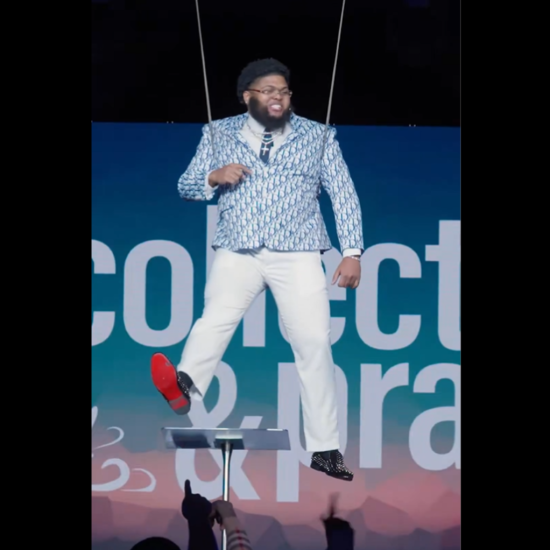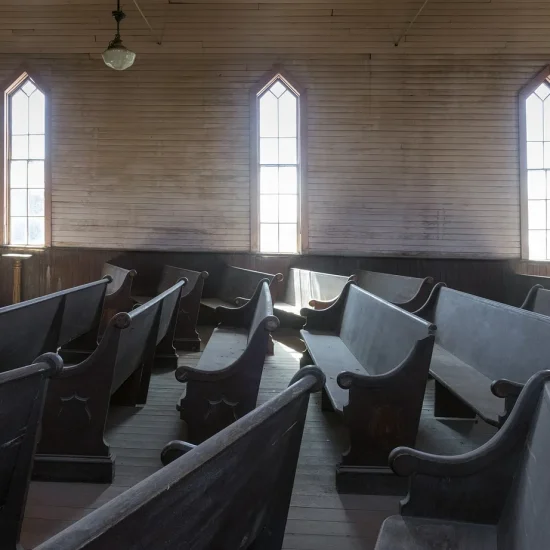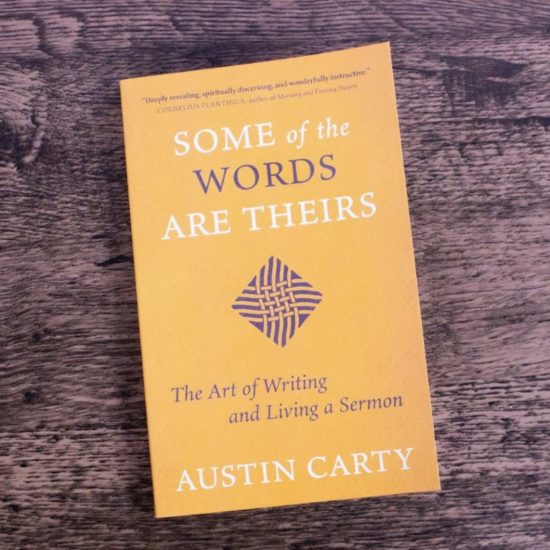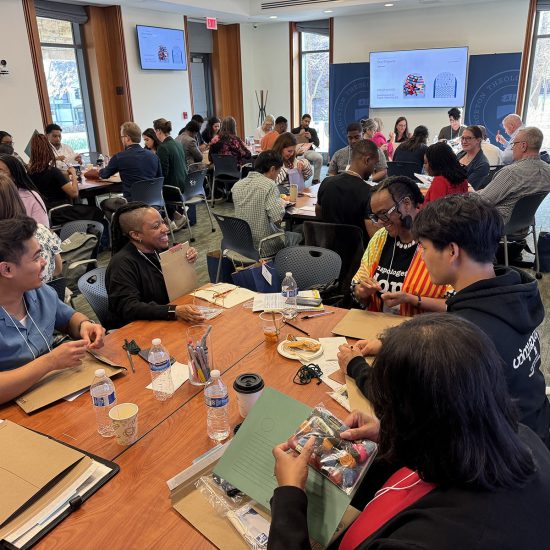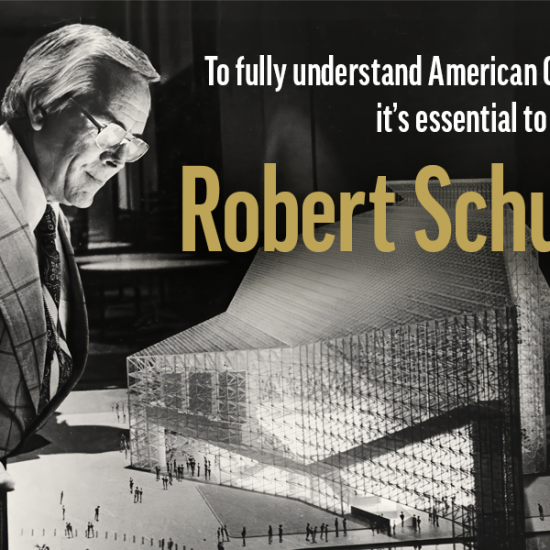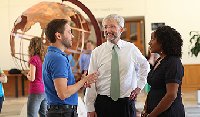
David Garland, dean of Baylor University's Truett Theological Seminary, visits with students. Truett focuses on a classical theological curriculum designed to give students the basis from which they can adapt methods to meet changing needs, he said. (Baylor University Photography/Marketing & Communications)
|
Students who serve in nontraditional ministry settings—whether a postmodern congregation, a cowboy church or something in-between—benefit from the foundation provided in a traditional seminary curriculum, some educators and ministry practitioners insist.
Baylor University's Truett Theological Seminary does not adjust its basic course of study to accommodate ministry in specialized settings, Dean David Garland said. Rather, the seminary offers a foundation in Scripture and theology that is "timeless and can bridge various contexts," he said.
"We seek to provide a solid biblical and theological foundation that equips students to adjust to the changing realities of culture," Garland said.
Likewise, Hardin-Simmons University's Logsdon Seminary emphasizes the importance of giving students a firm grounding in unchanging principles so they can adapt to a variety of contexts.
"Logsdon absolutely affirms the need for persons engaging in nontraditional ministry settings to obtain seminary preparation. Our coursework provides an indispensible scriptural and theological foundation, along with basic ministry skills applicable to a wide variety of ministry settings," said Bob Ellis, associate dean at Logsdon Seminary.
"Logsdon is especially focused on the spiritual formation of seminary students, concerned about helping them to mature as persons in Christ who are servant ministers, which is essential for any type of ministry. A significant element in Logsdon's seminary curriculum is the equipping of students in the ability to exegete various ministry contexts, especially cross-culturally, and to creatively develop strategies for effective ministry based on solid biblical and theological foundations."

Baptist Theological Seminary at Richmond sends its students to other parts of the world so they become familiar with what God is doing among Christians in a totally different culture.
|
Overly specialized courses of study in niche ministry today likely will be as irrelevant in the future as some classes some seminarians took decades ago are now, Garland observed.
"I remember when seminaries used to offer courses in bus ministry back in the '70s. Not very helpful these days," he said.
Instead of chasing fads, Truett focuses on a classical theological curriculum designed to give students the basis from which they can adapt methods to meet changing needs, he noted.
"Things are constantly changing, and we believe that we need to give our students the theological and spiritual foundation of the body divinity and encourage them to be able to think biblically and theologically so they can adjust as times change and so that they can 'become all things to all people, that they might by all means save some,'" he said, alluding to a New Testament admonition by the Apostle Paul in 1 Corinthians.
Thinking biblically means having a solid foundational knowledge of Scripture in a culture of low biblical literacy, Garland said. Thinking theologically involves not only accumulating knowledge, but also applying Scriptural truth within the context of human relationships, he added.
Truett's small classes and diverse student population help encourage meaningful interaction, as do the covenant groups students create as a part of the seminary's spiritual formations curriculum, he noted.
Furthermore, Truett students must complete service in a ministry setting as part of their seminary experience, gaining invaluable hands-on experience and developing skills in interpersonal relationships
"There are so many things that can't be learned in a classroom," Garland said.
In practical ministry settings, students work with a mentor of their choosing, a faculty supervisor and a lay committee. As a part of the process, students learn to apply scriptural principles and theological insights within a specific ministry context.
"Students reflect on actual experiences biblically and theologically," Garland said.
Toph Whisnant graduated from Truett Seminary in 2009 and last year became community pastor at University Baptist Church in Waco, Texas, a nontraditional congregation with a strong emphasis on the arts. One of his primary responsibilities on the church staff is to build relationships with students on the Baylor University campus.
The practical experience he gained working with a mentor at Calvary Baptist Church in Tuscaloosa, Ala., as he focused on campus ministry at the University of Alabama proved invaluable preparation for his current position, he noted. But so did his classroom experiences, he added.
"The theological training I received helps me engage the students here today. It's important when I minister to college students as they are forming their worldviews," he said.
Werth Meyes, pastor of the Cowboy Church of Erath County in Stephenville, Texas, likewise believes the theological training he received at Logsdon Seminary serves him well in a western-heritage church—particularly in a college town.
"With Tarleton (State University) here, we have a tremendous number of college students in our church, as well as faculty and administrators who attend. We have discovered a lot of the professional rodeo cowboys and cowgirls here are college-educated," Meyes said.
People who attend the church want serious Bible study—albeit coupled with roping or barrel-racing practice sessions, he noted.
"They don't want a dumbed-down gospel. They want to study the Bible seriously and think deeply," said Meyes, who completed his master of divinity degree and started doctor of ministry studies at Logsdon Seminary. "My seminary education has been invaluable in helping me go deeper into Bible study."
Whether in a traditional tall-steeple county-seat church or a cowboy church, ministers find themselves evaluated by the same criteria, he noted.
"I establish credibility not by how good a job I do roping but by how well I do ministry," Meyes said.
Some aspects of ministry cut across all cultural contexts, he observed.
"There are some constants in ministry—funerals, grief ministry, hospital visitation, helping people who are dealing with divorce and providing premarital counseling and education," he said.
"Preaching is constant. My sermon illustrations have changed, but how I prepare a sermon and do good exegetical research is still the same."
Seminary provides skills that always have to be adapted by any ministry practitioner in any context, he added.
"Seminary is not a box of answers but a toolbox," Meyes said. "I learned how to do research in seminary. Now I do it reading Western Horseman and Rodeo News, but the research skills are the same."

